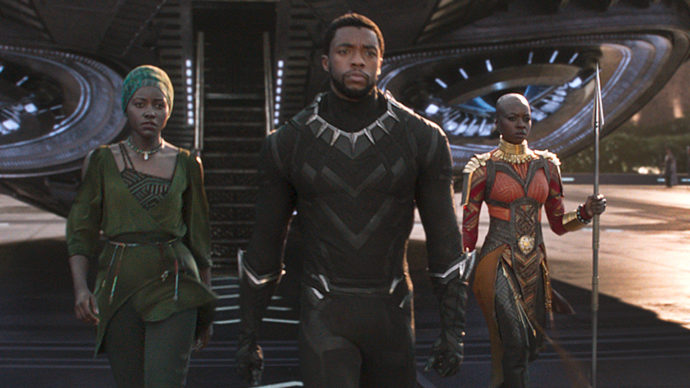When T’Challa, also known by his superhero alias Black Panther, was introduced to the Marvel Cinematic Universe in Captain America: Civil War, the immediate thought by many who walked out of the film was how much potential the character had for his own solo movie, as his scenes were largely the highlights and some of the most memorable moments in the film.
Thankfully, Creed director Ryan Coogler has been set to the task, as he delivers one of the strongest films in the MCU, thanks to its amazing world-building, fun setpieces, and fantastic performances, with Michael B. Jordan and relative newcomer Letitia Wright as the particular highlights.
The one element that immediately stands out in the first viewing is the world of Wakanda itself. Embracing an afrofuturist aesthetic, the nation of Wakanda has so much life in its designs, from the production to the costumes. It’s a place that is unlike anything else in current mainstream cinema, embracing African culture and showing it is more than just the “shithole” American media has typically depicted the continent as, with stunning technology, beautiful fashion (props to costume designer Ruth Carter), and beautiful art direction, all pulled together by cinematographer Rachel Morrison, who manages to shoot Wakanda with so much beauty and life that it’s amazing that the film was never shot in Africa to begin with. Although it should be mentioned that some of the CG effects do look sloppy, and some of the action scenes cut too fast, which doesn’t allow the fights to have the bite a film like Creed had.
But what really makes this film so great in comparison to the other MCU flicks is how defined the cast and characters are, as each character seems like a real person, only further showing just how powerful Black Panther is from a representational standpoint. There’s the recently widowed Queen Mother Ramonda, played by the great Angela Bassett, concerned over what will happen to her nation. There’s W’Baki, the head of Wakanda’s security, who is conflicted over who he has lost and his own inner loneliness, another complex character Daniel Kaluyya is able to play perfectly, after his film premiere in Get Out. There’s M’Baku, There’s Princess Shuri, the 16-year old tech prodigy, who takes the mineral of vibranium and creates all of the inventions and gadgets the city of Wakanda and T’Challa use. Meanwhile, she still acts like a fun-loving and easily excitable little sister to T’Challa, making her one of the most memorable and likable characters in the film, and shows that Letita Wright is automatically one of the most exciting young actresses working today. There’s the Dora Milaje, a team of women warriors headed by Danai Gurira’s Okoye, who hold their stature high and mighty, and deliver some highly enjoyable action setpieces. There’s Nakia, who wonders whether she should be T’Challa’s lover again, and her experiences working as a spy for Wakanda.
And while these characters are compelling and entertaining, the crux of the story and the world of Wakanda itself comes down to its hero T’Challa, played by Chadwick Boseman, and its villain Erik Killmonger, played by Michael B. Jordan. Boseman is wonderful as T’Challa, portraying the hero as a dignified and regal figure, yet also someone who is still confused about his own identity and living up to the legacy of those who came before him, and Boseman is able to pull off these complex emotions in an entertaining performance. But the real scene-stealer, and the figure who elevates Panther into becoming one of, if not the best film in the entire MCU, is Micheal B. Jordan as Killmonger. Through his backstory, his dialouge, and his fierce anger portrayed by Michael B. Jordan, we oddly enough get the most sympathetic character in the entire film, and one who will certainly resonate to many viewers. He outright attacks Wakanda for refusing to help the black people all over the world, and is angry at the years of oppression that colonization has done to his ancestors. What makes him work is that his beliefs are valid and legitimate. In many respects, what he is angry about is completely true, and it’s understandable why he has that mindset, and why many would argue he would work as a hero. But there is still just enough evil within his wants and desires that he is able to work as an antagonist and as a tragic figure. Michael B. Jordan flat-out steals the entire show, delivering an intense and powerful performance, through his actions, dialogue, and delivery, showcasing once again just how talented of a performer Jordan truly is.
Black Panther as a film works on so many levels, delivering on every level, from a direction, writing, and acting standpoint. It’s well-defined world, in spite of some shaky visual effects, thought-provoking themes, and terrific cast and characters, leads to it working as an MCU film, a superhero film, and an action film. But more importantly, its representational value, being a film from a black director, with an almost entirely black cast, in an afrofuturist environment, with characters who are about as non-stereotypical as they come, is absolutely wonderful, and if this kind of representation is what the future of global blockbuster cinema entails, then the next few years are looking to be very exciting.
